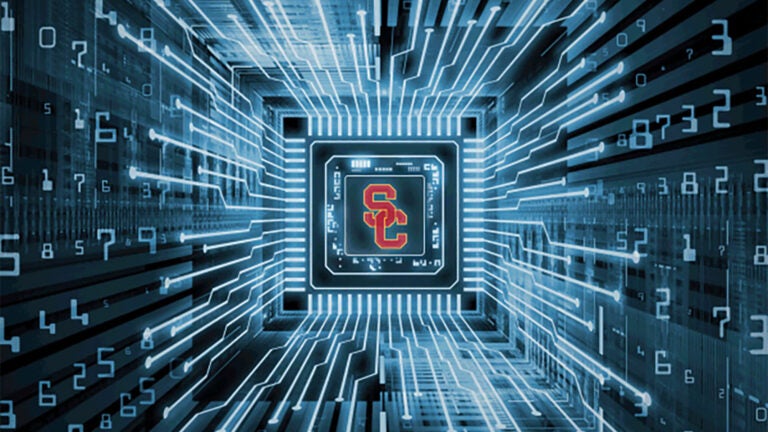
Frontiers of Computing design
USC announces $1 billion-plus initiative for computing including AI, ethics and quantum computing
USC launches $1B-plus initiative for computing including advanced computation, quantum computing, AI and ethics
- President Folt launches the largest, most comprehensive academic initiative in USC’s history.
- USC Frontiers of Computing includes opening a new School of Advanced Computing, enhancing educational opportunities in ethical computing for students across the university, advancing new research and expanding USC’s footprint in Silicon Beach, part of L.A. County’s growing tech corridor.
USC President Carol L. Folt launched a $1 billion-plus initiative to expand and infuse advanced computing throughout the university’s programs and curriculum with ethics at its core. Grounded in responsible technology, USC will accelerate innovation with novel and robust educational and research opportunities across all disciplines.
“I want every student who comes through our programs, whether they are in science, business, the humanities or the arts, to have a solid grounding in technology and the ethics of the work that they do,” Folt said. “We will integrate digital literacy across disciplines to create responsible leaders for the workforce of the future.”
The Frontiers of Computing initiative is a major step forward on one of Folt’s moonshots for USC. A $260 million gift to USC in 2019 jump-started the effort when Folt said the university would advance and expand computing research and education across the university in a strategic and thoughtful way.
Under USC Frontiers of Computing, USC unites its multiple strengths in computer science and advanced computing, data analytics, imaging, telemedicine and the creative economy. The initiative includes a new School of Advanced Computing that will serve as a nexus and incubator for advanced computation projects for students and faculty. It will spur research and innovation in advanced computing technologies, including artificial intelligence and machine learning, data science, blockchain and quantum information.
All of this will be guided by ethics and responsibility. USC has long been a leader in education, research and development that shape the formation of best practices for the uses of technology. The university will continue to acknowledge, anticipate and navigate the potentially adverse impacts of technology.
USC hosts a growing number of computer science graduates, including more than 1,330 graduate and undergraduate students who are set to earn their degrees this month, prepared to enter the jobs of today and spur the creation of new jobs for tomorrow through their own creativity, innovation and entrepreneurship.
Through USC Frontiers of Computing, USC will prepare society for a more tech-intensive world of work, spark new technological advances to improve people’s lives and shape responsible policy.